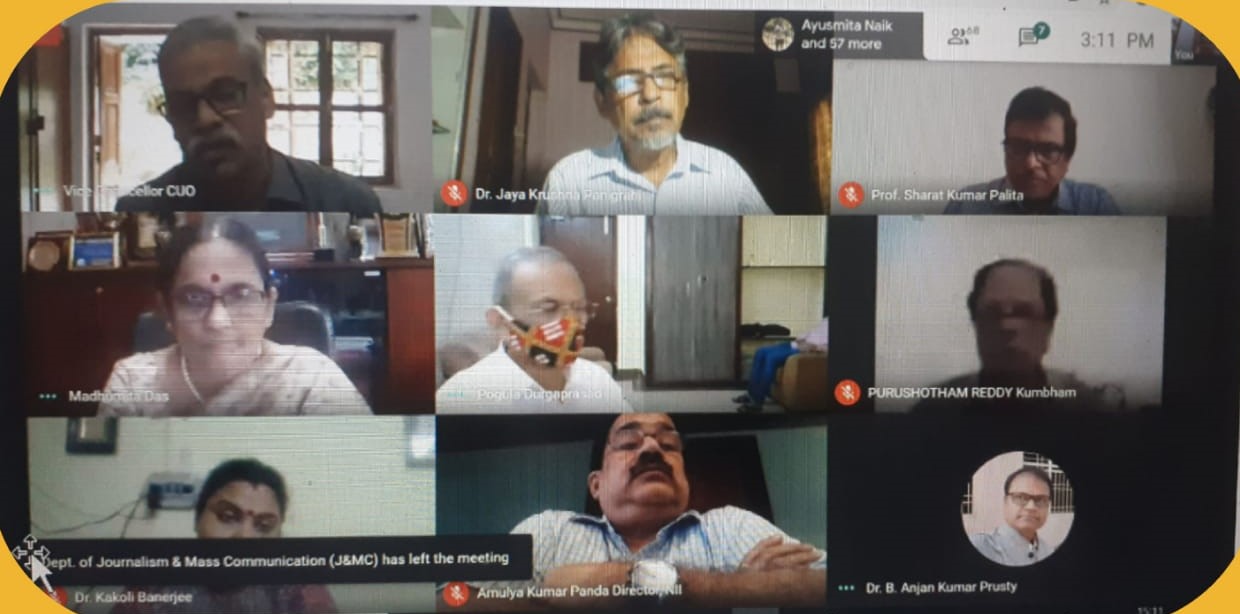National Level Webinar on “Biodiversity – Environment – Health“ organised by Central University of Odisha
Korapu: The Dept. of Biodiversity and Conservation of Natural Resources, Central University of Odisha organized a National Level Webinar on “Biodiversity- Environment- Health” on 30 July 2020. Inaugurating the webinar Vice–Chancellor Prof. I. Ramabrahmam said- Natural resources are nature’s gift and they are not abundant any more. Excessive use or misuse prompts nature reacts one way or other in relation to recent outbreak of Corona pandemic. Citing World Economic Forum Report-2020 he highlighted concern for loss of biodiversity and man-made environment disasters and said that- Nation States need to come out with policy responses and there need to have a reset of agenda of environment concerns.
Prof. Madhumita Das, Vice-Chancellor of F.M. University, Balasore in her lecture highlighted impact of climate change on biodiversity. Citing instances from our geological past how climate has changed with mass extinctions in different era and the sixth mass extinction is going to be caused by mostly human interference in nature, she said. Citing 27 percent of biodiversity loss in the last 37 yrs mostly due to encroachment of wildlife habitats which causing rapid loss of biodiversity that threatens food security, population health and world stability, she said. Discussing on COVID-19 pandemic she said that a small virus has made the world small but united, there is drop in air pollution, carbon emission, waters in the rivers have become clean we must learn positive lessons from it. Simultaneously she also deplored the large-scale usage of plastic and additional medical and hazardous waste generated during pandemic. The fundamental cure and prevention for this will be change in our life style towards nature, she said.
Dr. Amulya Kumar Panda, Director, National institute of Immunology, New Delhi in his lecture said – Odisha is a rich state where poor people live. Biodiversity of Odisha is rich, cited some examples of mushrooms of forests which are source of anti-cancer drugs, Kia flower (Pandanus species) source of costliest perfume of the world. Biodiversity research need to have thrust on growing elite genotypes, promote large scale culture, followed by processing and harvesting. Biodiversity should not only be treated from environmental point of view also from economic point of view which can transform life and livelihood of people. On Corona he said – creating a corona vaccine is not easy task, it will take minimum two years, whatever is going on these are prelimnary trials only. However, he said-all great adversities teach us lessons, and Corona virus has taught us many life lessons: accept the problem, communicate/share responsibility, implement strict measures, environmental effects follow well balanced disciplined life and respect for all life forms. India has tried its best to fight out pandemics. We have interfered with nature, and corona is one of the outcome. Respect the nature and respect our biodiversity. Pandemics has taught that all are equal and let us treat biodiversity equally. Concluding the talk he said, a time has come when we have spent more on health care and quality education.
Prof. K. Puroshothom Reddy, noted environmentalist from Hyderabad discussed about environment movement in the world and intervention of United Nations in the Millennium Development Goals and the the recent Sustainable Development Goals (SDGs). He discussed about ills of green revolution and promotion of organic farming and conservation of endemic flora nad fauna. Highlighting the neglect of conservation measures in the oldest mounatain ranges of India, i.e. Eastern Ghats need special attention of from ecologists and academicians. He also highlighted that 40% of Eastern Ghats is in Odisha and the natural resources of this area also requires special attention through sustainable development strategies that can transform the life and livelihood of the people.
The national level webinar was attended by faculty members, research scholars, students and academicians from Odisha and other parts of the country. Prof. S.K. Palita, Professor and Head, Convener of the Seminar gave the welcome address, and coordinated the proceedings. Dr. Kakoli Banerjee, Asst. Prof. introduced the guests, while Dr. Debabrata Panda, Asst. Prof. gave vote of thanks.

